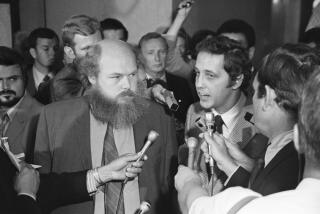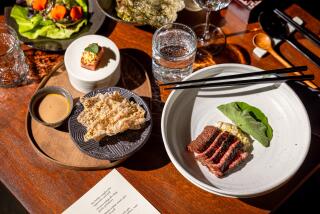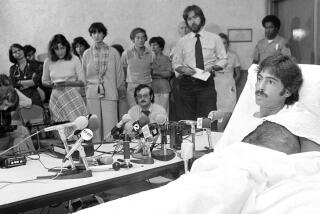THE SIMPSON LEGACY: LOS ANGELES TIMES SPECIAL REPORT : Twist of Fate / HOW THE CASE CHANGED THE LIVES OF THOSE IT TOUCHED : KATO KAELIN : My Dinner With Kato
Despite the sunglasses, it was easy to spot Brian (Kato) Kaelin as he sat outside facing the street at a Beverly Hills cafe. Maybe it was his trademark disheveled, shaggy blond hair. Or the motorists and pedestrians alike who screamed out: “Heeeyyyy Kay-Toe!”
Sixteen months after O.J. Simpson went to McDonald’s with Kato on the evening of the murders, I had dinner with the struggling actor who has been transformed into a person of such prominence that his first name is a household word.
Shortly after I introduced myself, Kato turned to the waiter and presented me as his spouse, telling him, “Bring my wife the dinner salad.” My eyebrows arched. “I don’t want the dinner salad. Bring him one,” I replied.
A shapely blonde sitting several tables away looked crushed. “Are you really his wife?” she asked. Before I could reply, Kato piped up, “Yes. Yes, she is.”
And so began my dinner with Kato, a meal in which conversation ranged from why he wanted to become an actor to what a drag it is, now that he’s a celebrity, to go out if he’s got a pimple or cold sore.
Kato--Nicole Brown Simpson’s friend and O.J. Simpson’s house guest--has benefited more from the case than any of the scores of others whose lives were inadvertently touched or tainted by it. He alone has achieved true fame. He hosts his own radio show on KLSX-FM five afternoons a week. The station claims he attracts even more phone calls than its popular late-night rock and roll psychic, Voxx.
Opportunities abound. He was tapped for a slew of high-profile public and television appearances. Annie Leibovitz shot his portrait and Larry King invited him to his wedding. When he goes running, he says, women lift their shirts, flashing their flesh. And a sheik offered to buy him for $10 million--an offer he declined.
This instant celebrity “just happened overnight,” Kato says. “What reason it happened I don’t know, but it’s from a higher source so I don’t make a biggie out of it.”
None of the hullabaloo has prompted Kato to polish his just-a-regular-stumblin’-kinda-guy shtick. “I’m humble,” he says. “The media attention thrown at me hasn’t changed my life, hasn’t made me a different person.”
During our meal, conversation ricocheted from one topic to the next, with sentences sometimes rambling on without ever being completed. It was Kato being Kato, a 36-year-old man who has honed equivocation to an art and hates to answer a question unless it’s essential--say, for spin control. He is a man with a certain warmth and humor that he describes as cornball where others might employ less-charitable adjectives. (“What’s a Martian’s favorite dessert?” he asked recently on his radio show. Answer: Marzipan.)
Our time together was a reflection, in some respects, of the frustrating testimony viewers saw in court, testimony that left millions wondering whether Kato had said all he knew about the fateful evening of June 12, 1994. Questions that begged a real answer fell into an abyss. What, for instance, would Kato want to do differently on the witness stand?
“I wish I was allowed to . . . uhhh,” he says, without ever finishing.
Later, he explains that his attorney had admonished him not to speculate on the witness stand. And he wishes he had not been so nervous. “I answered everything that was asked of me, that’s the bottom line,” he says. “I did what I had to do.”
With that, Kato asks the waiter for olives. Hold the shallots.
For all the fans who cheer Kato, for all the hundreds who ask for his autograph or for a date, there’s another portion of America that’s openly hostile. After GQ recently ran a six-page photo spread on Kato, the magazine printed several letters from irate readers.
“How dare you?” wrote one.
“The fact that Kaelin has used the murders of two people to help boost himself and his career is appalling,” wrote another.
After we placed our dinner orders, Kato brought up these letters, explaining that “for a half-hour, I was kinda hurt. . . . I am always being judged.”
Kato is used to people accusing him of capitalizing on his friendships with the Simpsons, so his rebuttal has a well-worn ring.
“I never asked for interviews, photo shoots--it all came to me,” he says. “Ever since I was a little kid, I’ve had the same goal my entire life. It’s not like becoming premed and deciding, ‘You know what, I think I like the show-biz thing now.’ ”
At times, when he hears criticism, Kato thinks of what his mother used to tell him when he was a youngster in Wisconsin. “Every knock is a boost,” she’d say. Kato tries hard to believe that. But his own mother cries, he pointedly tells me, when people say mean things about her son. And it’s not like his 11-year-old daughter, who lives with her mother, can’t read, he adds.
Looking earnest and without blinking, Kato explains that in some respects the trial hurt him professionally. “I’ve lost a lot of work because of the trial,” he says, leaning forward. In Hollywood, “word was ‘he’s too hot’ because of the trial.” Didn’t the benefits far outweigh the damages? “Well, yeah,” he says slowly. “There’s been more offers because I was out in the media so much. But I didn’t do anything wrong. I didn’t ask for anything.”
He insists he would have reached this height with or without the notoriety of the case. “I’m not going to count on the trial to make my career,” he says. “I never did before. I’m going on auditions and have to prove myself. I don’t want a part handed to me.”
Skipping a beat, he continues, joking. “OK, maybe a few parts.”
Our conversation is interrupted when a blonde sitting by herself calls out to Kato, “Did you get the crayons I sent you?”
No, Kato didn’t. Without further ado, the woman, whose short cutoffs reveal long stretches of leg, explains that she only happens to be in this particular cafe because it’s near her dressmaker and she’s having a little something made for her date with Fabio, the supermodel.
“Why bother?” Kato says. “He’s only going to tear it off you.” Turning to me, he orders, “Don’t print that.”
With that the woman sashays up to our table and asks if Kato will help her with “charity work.” When she asks for his telephone number, he jots something down. Clearly, she’s disappointed. “That’s your agent’s number,” she says. “I’ve already got that.”
Kato is saved by 15-year-old Nathan, walking a bicycle on the sidewalk. “Hey Kato!” he shouts. Nathan makes a beeline for our table and brazenly chastises Kato for not showing up at an event where he had pledged to appear. Kato gamely tries to talk his way out, winning only after he agrees to buy a box of red licorice from Nathan, whose wares are being peddled for an anti-drug program.
“Great, keeps kids off drugs and makes them diabetics,” Kato replies, offering the licorice to the blonde, who has retreated, and to another woman sitting alone nearby.
“Drive safe. Pick out a nice dress,” he calls to the departing blonde.
“I am very easy to approach,” explains Kato. “This happens all the time.”
As a result, he doesn’t have the same appetite for clubs, preferring private functions. And when he goes to the movies, he goes late or attends private screenings.
“I feel sorry for people who have to go out with me,” he says. “I hear people saying ‘Why is she with him? She’s ugly.’ ” In fact, one evening, he found himself consoling his date, telling her it didn’t matter what people said, he thought she was beautiful.
In other ways, too, Kato’s life has changed. No more stints in some other star celebrity’s guest house. Ten days after the murders, he moved out of Simpson’s guest house where he had lived rent-free. After a series of moves, he now rents a two-bedroom apartment.
Emotionally, he is far more guarded than he once was. “I’m not as outgoing anymore,” he says. “I don’t trust people as much as I used to.”
At the same time, he feels more appreciative of his own circumstances. “I know life is precious, and I’m much more aware of how precious and short life is.”
When he thinks now of his own professional image, there is indeed a message he wants to relay.
“I am not a dummy,” he says. “That’s D-U-M-M-Y.”
After 2 1/2 hours at the dinner table, Kato is impatient to leave. I pay the check and we walk out together into the soft darkness of a Beverly Hills evening. A motorist leans on the horn and waves after spotting Kato on the sidewalk.
Kato turns to me. “Feel my muscle,” Kato says, gesturing toward his bicep.
“Excuse me?”
“Go ahead,” Kato says. “Feel my muscle.”
More to Read
Sign up for Essential California
The most important California stories and recommendations in your inbox every morning.
You may occasionally receive promotional content from the Los Angeles Times.









